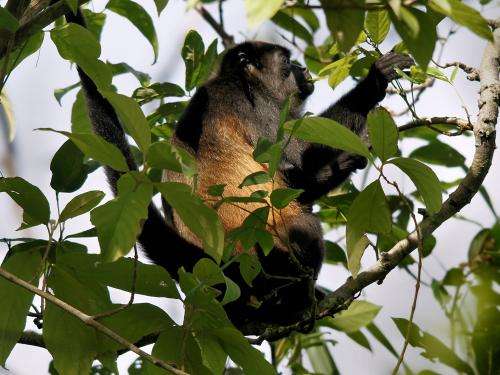Mutations in the mantled howler provoked by disturbances in its habitat

The disturbances of the habitat could be affecting the populations of the mantled howler, or golden-mantled howling monkey, (Alouatta palliate Mexicana) who in an extreme case could be developing mutations that make them less resistant to diseases and climate events, reveled by a study of the Ecology Institute.
Juan Carlos Serio Silva, head of the project, of which the objective was to know the structure and genetic diversity of this monkey's populations and see in which way their habitat fragmentation is affecting them genetically.
The mantled howler is one of the three species of primates distributed in the jungles of the southeast of the country and is, without a doubt, the one that present the biggest reduction and isolation of its populations.
This phenomenon has carried the monkeys to the point of near extinction. Joined to this fact, very little genetic studies have been carried out in Mexico regarding this specie.
To carry out the project the researchers collected hair from the bodies of the mantled howlers in four different regions, using a noninvasive technique with sticky darts.
Each one of this regions was divided in two zones: disturbed and the ones without human impact. In total, 300 samples of hair were collected and analysed for DNA extraction.
One of the principal findings was that the fragmentation of the jungle has induced in the primates the development of different behavioral patterns like in family breeding.
The authors of this study suggest that if this situation becomes more extreme could cause mutations that would make them less resistant to disease and climate events.
Another trascendental result is that apparently the mantled howlers in the state of Veracruz (south east of the country) come from two different maternal lineages, which is believed to have happened because of different colonization events in this region.
The researcher also highlighted that a way to help conserve this primates would be to stop disturbing their habitat avoiding the negative effects of in family breeding and resulting in a better ecological, behavioral and health quality of life.
Finally, he added that a deeper research of the genetic variability in the next generations of mantled howler is important to know the evolution of the fragmentation process and it biological print.
Provided by Investigación y Desarrollo
















